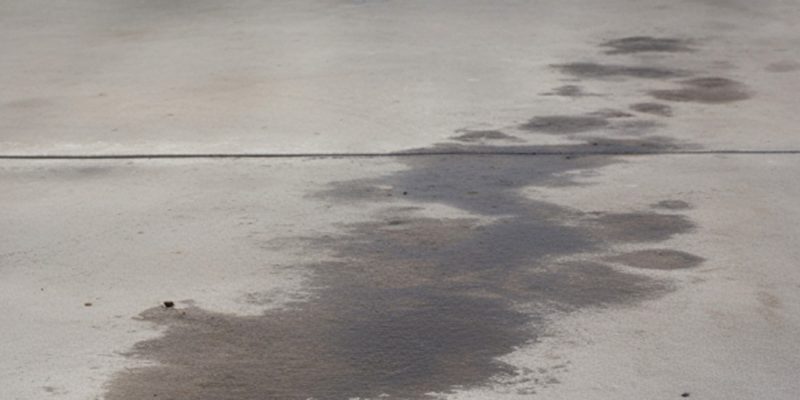Hello, Des Moines homeowners! Struggling with those unsightly grease stains on your concrete driveways and patios? Fear not! This guide will walk you through effective ways to remove those stubborn marks. By the end, you’ll have all the knowledge you need to tackle grease stains head-on and keep your concrete surfaces looking their best.
Understanding Grease on Concrete
Grease is more than just a dirty mark on your concrete; it’s a slippery substance from cooking oils, car oils, and more. It’s challenging because concrete, like a sponge, absorbs liquids easily. This means grease can penetrate deeply, making removal tough. Grease not only spoils the look of your concrete but also poses safety risks and can damage the concrete over time. Identifying the grease type, whether it’s from your weekend BBQ or a leaky car, is crucial for choosing the right cleaning approach. Let’s dive into how these different stains behave and how you can effectively remove them.
Types of Grease Stains and Their Challenges
Different grease stains require different tactics:
- Automotive Grease: This is a tough nut to crack. Coming from vehicles, it’s a mix of oil and automotive fluids, making it dark and stubborn. For these stains, strong cleaners like commercial degreasers are your best bet.
- Cooking Oil and Food Grease: Common in outdoor cooking areas, these stains are slightly easier to tackle. Household dish soap, known for cutting through kitchen grease, is often effective.
- Construction-Related Grease: These stains can occur during home improvement projects and are similar in nature to automotive grease, often necessitating potent cleaning solutions.
Each type presents unique challenges: automotive grease is stubborn and thick, cooking grease can spread and soak in quickly, and construction grease may be mixed with other substances. Knowing the type of grease helps in selecting an effective cleaning method, tailored to the specific challenge it presents.
Step-by-Step Guide to Cleaning Grease Stains
Tackling grease stains can be straightforward with the right approach:
Immediate Actions
Quick action is key for fresh grease. Blot, don’t rub, using paper towels to absorb as much grease as possible without pushing it deeper into the concrete.
Choosing Cleaners:
- For Cooking Grease:
- Dish soap mixed with warm water is a great start.
- Baking soda paste (mix baking soda with water) can be effective for lighter stains. Apply the paste, let it sit, then scrub and rinse.
- White vinegar is another eco-friendly option. It can break down the grease when applied directly and left for a few minutes.
- For Tougher Stains like Automotive or Construction Grease:
- Commercial degreasers are strong and effective. Be sure to follow the product’s safety instructions.
- Trisodium phosphate (TSP) mixed with water creates a powerful cleaning solution. Use with caution, as it’s quite potent.
- WD-40 or similar lubricants can help loosen stubborn grease spots before washing with a degreaser.
- For Old, Stubborn Stains:
- A poultice made from a solvent like lacquer thinner and an absorbent material like cat litter can draw out deep stains. Apply, let it sit for 24 hours, then remove.
- Oxygen bleach is a less harsh alternative to chlorine bleach and can be effective on older stains.
The Cleaning Process:
- Apply the Cleaner: Gently apply the cleaning solution directly to the stain. Allow it to penetrate the grease for a few minutes for dish soap, longer for degreasers.
- Scrubbing the Stain: Using a brush with stiff bristles, such as a broom, thoroughly yet gently scrub the area. This helps lift the grease from the concrete.
- Rinsing Off: Wash away the cleaning solution and lifted grease with water. A pressure washer is ideal, but a garden hose can also be effective.
- Repeat if Necessary: For older or more stubborn stains, a second or even third application may be needed.
Patience and persistence are key here. Even the most stubborn stains will usually yield to repeated, careful cleaning.
Things to Consider Before Cleaning
Prior to cleaning, consider these factors:
- Type of Concrete: Older, more porous concrete may require gentler cleaning methods to avoid damage.
- Age of Stain: The older the stain, the more challenging the removal, often requiring more time and repeated cleaning efforts.
- Environmental Considerations: Think about where the cleaning runoff goes. Harsh chemicals should not enter your garden or the local storm drain. Opt for environmentally friendly cleaners when possible.
These considerations will help you choose the most suitable cleaning method for your concrete, ensuring effective stain removal while protecting your environment.
Additional Tips for Effective Cleaning
Enhance your cleaning efforts with these tips:
- Using Hot Water: Hot water can be more effective in loosening grease, similar to washing greasy dishes.
- Mechanical Aids for Stubborn Stains: For particularly stubborn stains, a putty knife can be used to gently scrape off the grease layer. Caution is advised to avoid scratching the concrete.
- Preventing Future Stains: Preventing stains is easier than removing them. Regularly check vehicles for leaks to avoid driveway stains and use protective mats under grills or fryers in outdoor cooking areas.
Regular maintenance and preventive measures can significantly reduce the frequency and severity of grease stains on your concrete, saving you time and effort in the long run.
Common Concerns and Questions
Let’s address some common questions and concerns:
- Persistent Stains: If standard methods fail, consider stronger chemical cleaners or professional cleaning services. Persistent concrete stains may require more aggressive treatment.
- Safety with Chemicals: Always prioritize safety when using chemical cleaners. Wear protective gloves and avoid inhaling fumes. If you’re concerned about the environmental impact or personal safety, look for eco-friendly cleaning solutions.
- Preventing Grease Stains: Preventative measures can be highly effective. For driveways, ensure regular vehicle maintenance to prevent leaks. For patios, use protective trays and mats under cooking equipment.
- Risk of Damage: The right cleaning method and careful application will minimize the risk of damaging your concrete. Always test a small, inconspicuous area first if you’re unsure about the cleaner’s effect on your concrete.
- Eco-Friendly Options: For those concerned about environmental impact, eco-friendly degreasers and natural cleaning agents like baking soda or vinegar can be effective, especially for lighter stains.
Taking care of your concrete is not just about aesthetics; it’s also about maintaining its integrity and ensuring a safe, clean environment for your home.
Conclusion
With these guidelines, you’re all set to tackle grease stains on your concrete surfaces. Remember, the right approach and a bit of elbow grease go a long way. Keep your concrete clean and well-maintained, and it will enhance the beauty and safety of your home. Happy cleaning, and enjoy your rejuvenated outdoor spaces in Des Moines!

